Cowboy and El Gato: Godfathers of Austin's "Brown Sound"
Manuel Donley and Ruben Ramos updated traditional Mexican music with the times
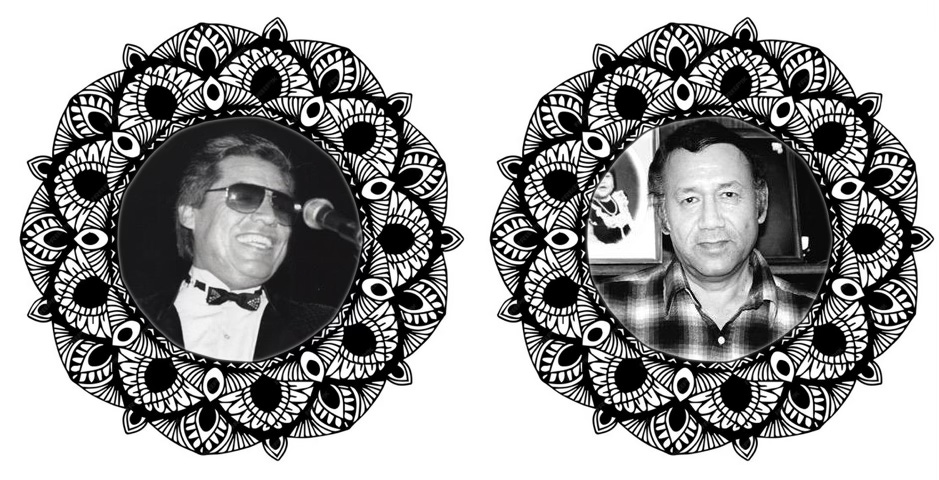
The nascent Austin Tejano scene was ruled by musical families named Donley/Guerrero and Ramos, who covered the spectrum of musica tejana, from Mexican folk songs and polkas to big band orquestas. Manuel “Cowboy” Donley, the nephew of noted corridos composer Lonnie Guererro (1917-1994), introduced electric guitar to Tejano in 1956 with his six-piece Las Estrellas. A few years later, Ruben Ramos got out from behind the drums of his family band to become the silky, soulful front man of horn-driven Tejano. Donley, whose biggest hit was probably “Flor del Rio” on Valmon Records in 1965, played until he was 90, with a regular gig at El Gallo restaurant on South Congress. Ramos, backed by his Mexican Revolution band, is still going strong at age 84. They owe their career longevity to being able to quickly adapt to a changing audience that went from entirely Spanish-speaking to bilingual.
"When we started up, you had mariachis that played music from Mexico, orquestas that were like big bands and played stock arrangements from sheet music, and conjuntos that featured the accordion as the main solo instrument,” Donley told the Statesman in 1986. “We tried to do something different, and blended them all."
With electric bassist Mike Amaro, and drummer Emilio Villegas replacing brushes with sticks, Las Estrellas brought Tejano into the rock ‘n’ roll era. “They called me a monster,” Donley told music scholar Evaliza Fuentes in 2018, two years before he passed away at age 92. But Las Estrellas would always win the Sunday “Mexican Night” battles at the Skyline Club—their sextet beating orchestras twice their size. Donley’s Fender transformed traditional Mexican music, as honky tonk did Western swing.
The son of violin-playing barber/ bandleader Ramõn Donley (whose father was Irish, mother Mexican), Manuel was born in Durango, Mexico, and moved to Texas with his large family at age seven. He learned to play guitar behind his father’s Sixth St. barbershop, a block west of where I-35 is now, which hosted a session almost every night. “Playing until daybreak with the old guys was my school,” Donley said of the lessons on how to play polkas, waltzes, foxtrots, rumbas, and more. Ramõn was nicknamed “Professor” for his musical knowledge, while his son earned the nickname “Cowboy” because he stood at the front of the stage when he played, like country stars of the day, not seated on a bandstand. Donley roamed East Austin with a guitar, a Latino Gene Autry.
“I used to go to La Perla on East Sixth and Comal, and when I walked in with my guitar they unplugged the jukebox,” Donley told the Austin Chronicle.
With his Estrellas, Donley played East Sixth Street clubs like La Fuentes, Brazos Bar, El Gato Negro, Las Cuatro Copas, Green Spot and eventually dance halls like Dessau, and City Coliseum. His sisters had a vocal trio, backed by father Ramon on guitar, called Latin Liberation, then Trio Latino, after they couldn’t get gigs in the white clubs.
Austin’s regard for its citizens of Mexican descent were set in a city-sponsored 1913 Social Survey, which justified putting the city dump at the edge of “Mexican Town” (between Congress and Rio Grande, E. 4th and the river) because “Mexicans have all the filthy habits described already.” But by the ‘60s, the swanky Nash Hernandez Orchestra played dance music all over town.
Like Donley, Ruben Ramos came of age in the ’50s Tejano scene, as the handsome, humble singing drummer of the Alfonso Ramos Orchestra, led by his older brother. In the ‘60s he got a well-paying job as a computer programmer for the state, which limited gigs to weekends and restricted touring. By the time he finally chose to focus on music as his career in 1973, Ramos was the embodiment of suave.
Born in Sugarland in 1940, Ruben grew up in Utley, thirty miles east of Austin, in a family of musicians that, at first, played mainly for their own entertainment after a day of picking cotton. Mother Elvira (Perez) was a good guitarist and father Alfonso Sr. played fiddle. Ten of their brothers were musicians, as were Ruben’s six brothers and sister Inez. They learned, early on, that they could make more money in the clubs and VFW halls than in the fields.
Pearl Harbor broke up most bands, including the family’s first, Los Serenateros. After returning from WWII, Elvira’s brother formed Justin Perez and the Ex-G.I.’s, a popular dance band where the generations merged. Alfonso Ramos Jr. sang for his Uncle Justin’s group before moving on to the Nash Hernandez Orchestra, and then the Ramos-Guerrero Band with Louie Guererro, Lonnie’s son, who wrote the international hit “Peanuts” (covered by Herb Alpert’s Tijuana Brass).
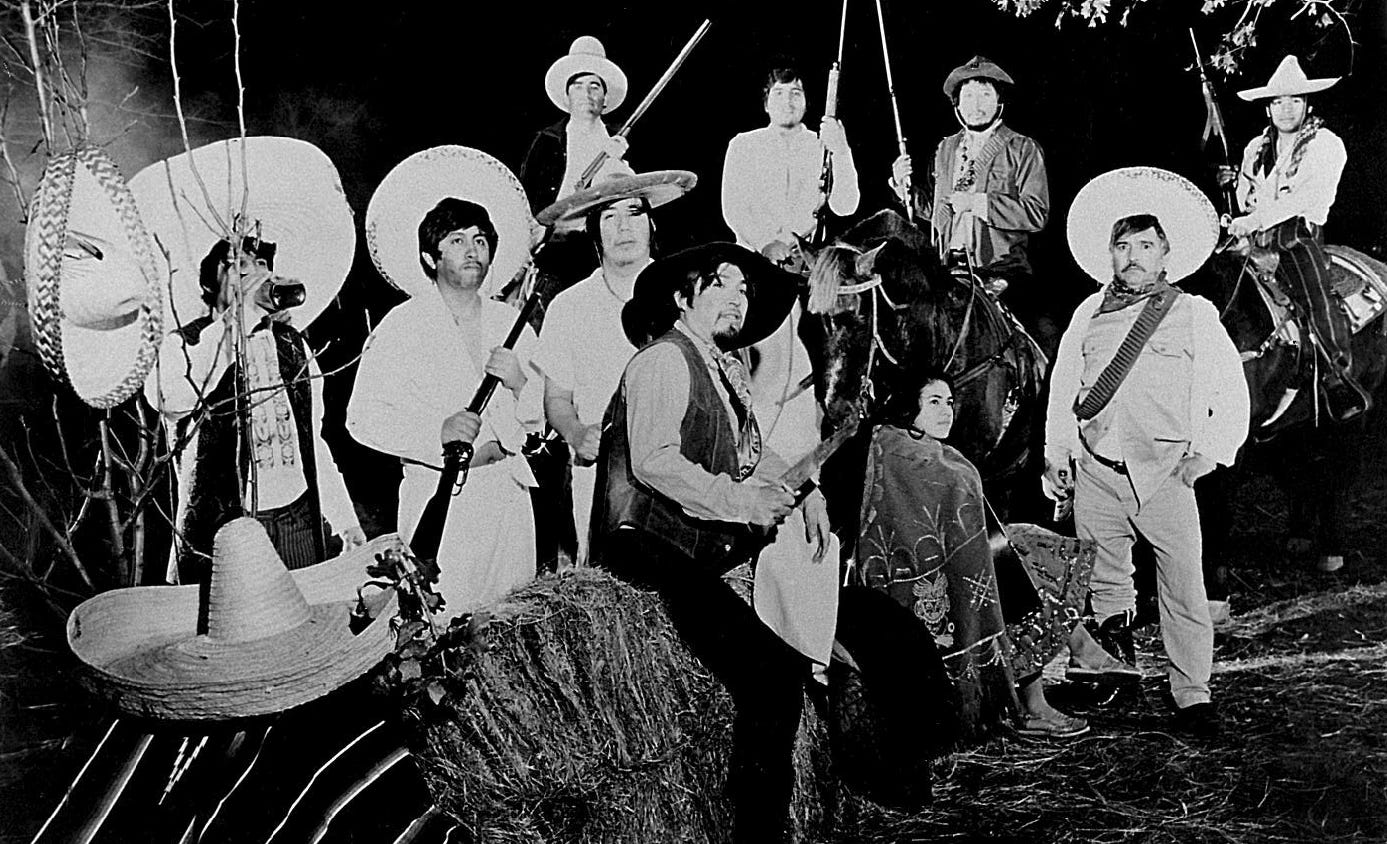
In 1969, Ruben and bassist brother Roy co-founded the Mexican Revolution, named in concert with the Chicano rights movement, with Ruben’s impassioned tenor and great presence front and center. Bandleader Roy, who everyone called Pia, was a master of arrangement. Ruben had sung all the English-language songs by Fats Domino, Elvis Presley and Little Richard in Alfonso Jr.’s group, but now he would also have to sing in Spanish, which he stopped speaking at home when he started going to school. Wearing white suits with black shirts, he became “El Gato Negro,” the coolest cat on the circuit and beyond.
In the ‘80s, when Tejano became popular across the Southwest and in California, the band changed names to Texas Revolution. They hit a rough patch, however, when the horn-driven orquesta style (Ides of March’s “Vehicle” with hydraulics) was replaced in popularity by young Tejano bands using synthesizers. Ramos stuck to his refusal of cost-effective synths, and was dropped by Sony Records, but eventually experienced a career upswing in the ‘90s, when real horns became back in favor. “The brass sound is in my soul,” the singer told Cathy Ragland of the Statesman in ‘96. He’d signed with Virgin that year and released a pair of well-received albums- El Chupa Chavaz and El Gato Negro Smooth- in quick succession. He was at the top of the game when asked to join a new Hispanic supergroup formed in the wake of the Buena Vista Social Club phenomenon.
Ruben y Los Super Seven
Bands are discovered at SXSW, not put together there. But Los Super Seven grew out of a jam on traditional Mexican music in the back patio at Las Manitas restaurant on Congress Avenue in March 1997. The collective recorded a self-titled debut LP on RCA in ‘98, then won the best Mexican-American album Grammy in 1999.
To play the Tejano circuit is to perform exclusively in the Mexican-American world, but Los Super Seven would be the first time, besides festival gigs and private parties, Ramos sang for mixed Anglo and Latino audiences.
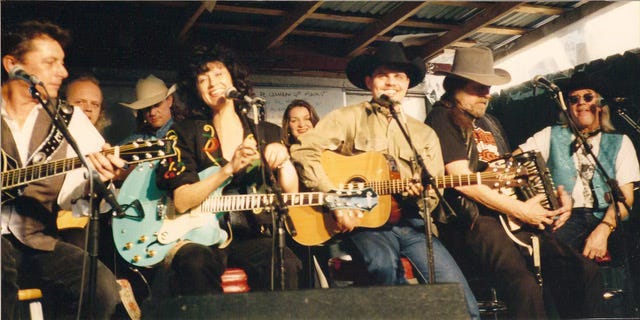
The original Seven were Ramos, David Hidalgo and Cesar Rosas from Los Lobos, Freddy Fender and Flaco Jimenez from Texas Tornados, country star Rick Trevino and token guero Joe Ely. Guesting on the Steve Berlin-produced debut were Doug Sahm, Max Baca, Joel Guzman, and others. Two more Los Super Seven LPs came out- Canto in 2001 and Heard It On the X in 2005- but Austin singers Ramos and Treviño are the only ones on all three albums.
“Ruben Ramos was the soul of Los Super Seven,” said Rick Clark, the Memphis music journalist who helped assemble the collective with project overseer Dan Goodman (Treviño’s manager). When Ruben walked into Cedar Creek studio in South Austin in the spring of ‘98, the sessions for Los Super Seven got a lot more authentic. “If anyone had the right to act like a prima donna it was Ruben Ramos,” said Clark. “Everybody was in awe of him, but he was so humble. He was as honored to be a part of Los Super Seven as we were to have him.”
Ruben Ramos went back to the Mexican Revolution name in the 2000s, and enjoyed another career resurgence, the Tony Bennett of Tejano. Viva La Revolucion, a culmination of 35 years of musicianship and class, won the 2009 Grammy for best Tejano album. Here’s the leadoff track.



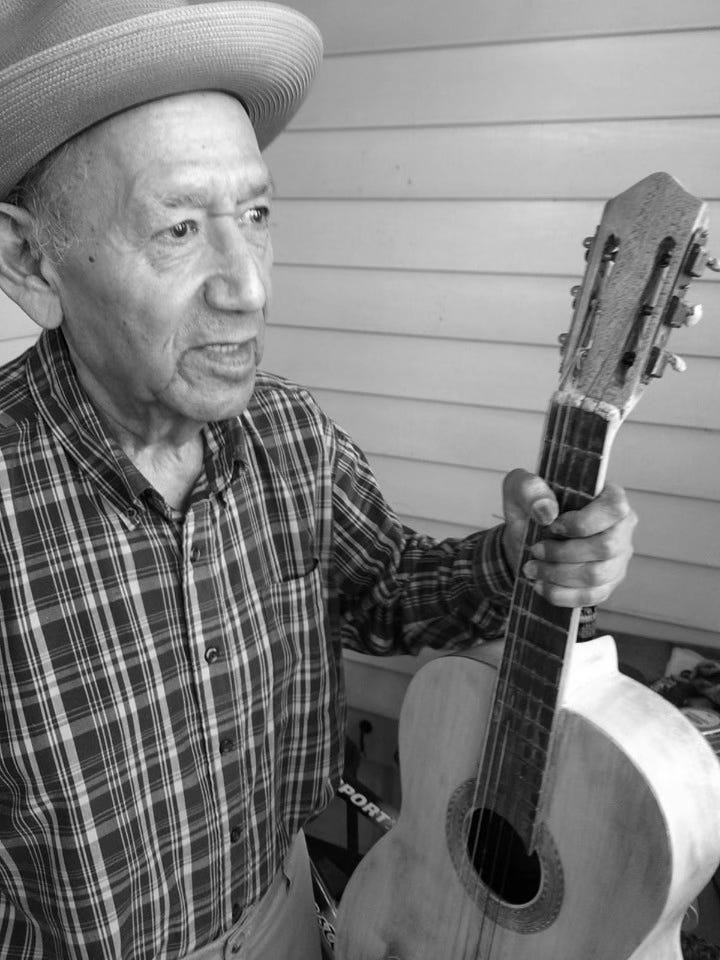
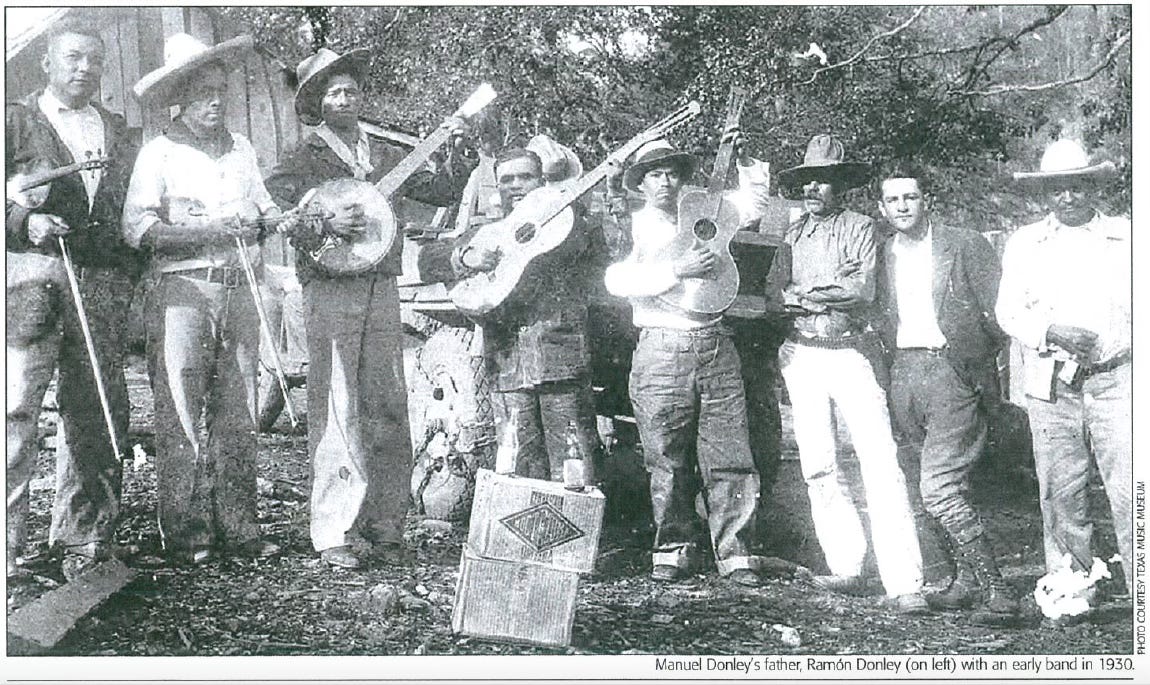
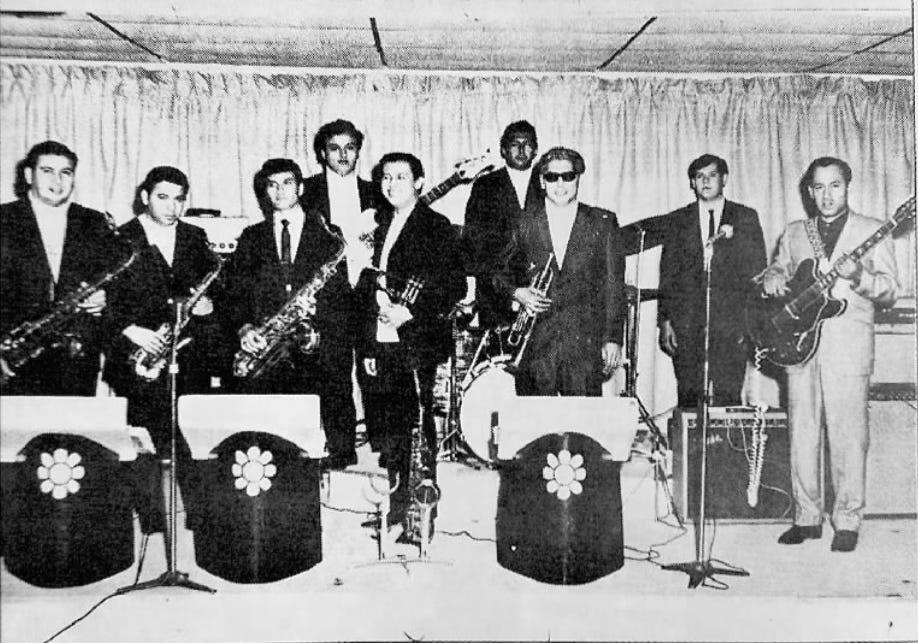
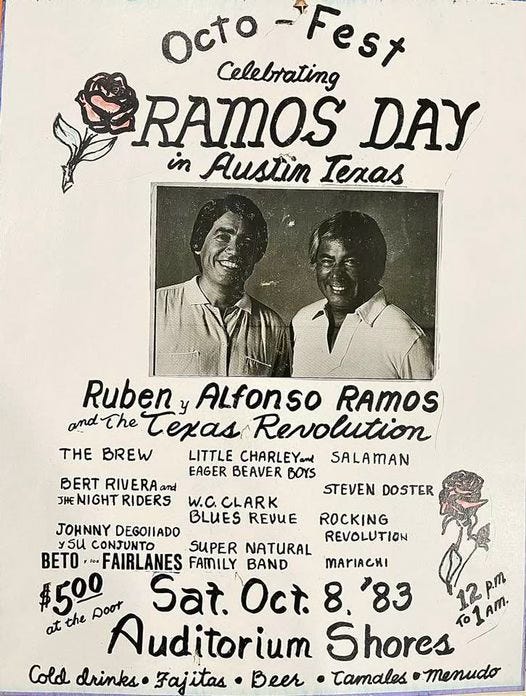
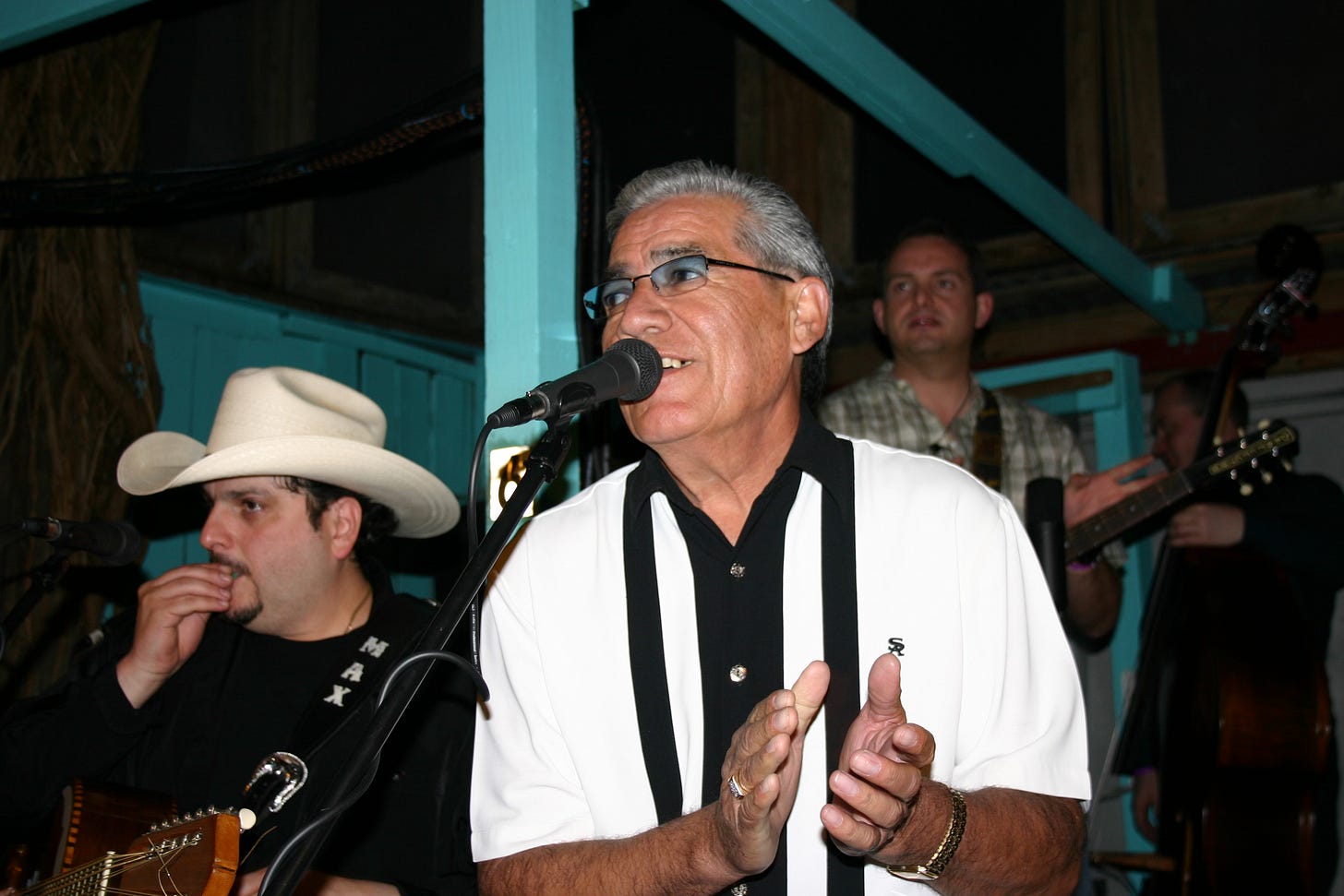
Joe Ramos is my neighbor. He's got some stories about acts they've played with through the years. He told me they never knew they had to be members of the Academy in order to win a grammy, so they finally joined and immediately won one. He still loves to gig and has a variety of genres he can play.
Sir Doug always seems to appear when needed…bringing his “groover’s paradise” vibes to sprinkle over the “sound of the music”